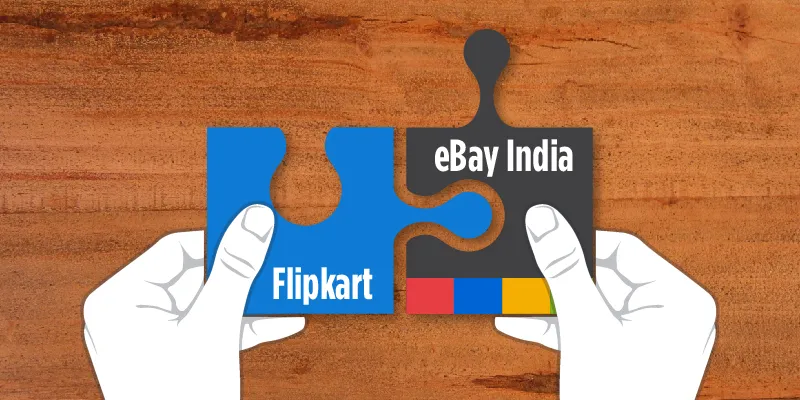The Flipkart fund raise has finally happened, and many Indian startup founders and investors are breathing easy. Flipkart is, after all, considered a bellwether of the Indian startup ecosystem, and a fund raise by the e-commerce major can change market sentiments. The company has raised $1 billion in fresh funding at a valuation of $10 billion, according to YourStory’s sources. Numerous news reports, too, mention this fund raise, but Flipkart itself has not confirmed it yet.
Microsoft, eBay, and Tencent Holdings are the new investors. YourStory sources also say that Flipkart is set to raise a further $1 billion as part of this round, but that is contingent on the company merging its operations with eBay India. More than the funding, the merger could have far-reaching implications for not just the companies involved, but for the Indian e-commerce industry overall.
YourStory reached out to both Flipkart and eBay India representatives. While Flipkart declined to confirm the fund raise at this stage, eBay India too declined to discuss details about the possible merger, calling it market speculations.
Would a merger of operations between Flipkart and eBay India make sense and be beneficial for both companies? As with most things in life, the answer is not a clear yes or no.

A costly win for eBay
The major stumbling block here are the differences in their operations. For example, eBay is focused on consumer-to-consumer transactions, and lets sellers list used goods and also refurbished goods. Flipkart, on the other hand, only lists sellers who sell brand new products, and does not allow C2C sales.
For eBay, a merger of its India operations with that of Flipkart will be seen as a win. eBay launched in India in 2005, two years before Flipkart’s arrival, a year after it acquired Baazee.com for about $50 million. But eBay was never able to capitalise on this first-mover advantage, with Flipkart, Snapdeal, ShopClues, and Amazon all able to race ahead of the company. eBay’s investment in Snapdeal in 2013 was expected to be a precursor to a merger of the two entities, but that never happened. In 2015, the San Jose-headquartered company sold part of its stake in Snapdeal. In recent months, Snapdeal has been in the news for all the wrong reasons, from employee firings to reports that it is up for sale. All in all, a merger with Flipkart will be a face-saving move for eBay.
But at what cost?
eBay will have to pay a huge price if Flipkart gets a valuation of $11 billion. After all, eBay is a listed company, which is more profitable than Amazon (highest valued after Alibaba) with $25 billion in May 2016,
said an e-commerce insider who is aware of the behind the scenes dealings of the fund raise and spoke on condition of anonymity. The idea is that eBay will have to pay a premium, especially if it wants the merger. The insider further noted that while eBay would prefer an equity swap, Flipkart doesn’t need eBay’s equity. It needs capital to take on Amazon and the growing threat from Alibaba and Paytm. So, eBay will have to pump significant capital into Flipkart for a possible merger.
The other plus for eBay is that it will help the company fight Amazon. A prominent e-commerce entrepreneur with direct knowledge of developments in the industry said,
eBay has always wanted to be Amazon – even in the US. But its target audience is different. In India, it might stand a chance against Amazon, as Flipkart targets the same audience as Amazon does. It will not make sense to acquire Snapdeal as it has failed in its efforts to compete with Amazon and Flipkart.
Mixed bag for Flipkart
The big disadvantage for Flipkart is dealing with a relatively inflexible partner. “eBay is not flexible; they are not keen on doing new things. Flipkart and eBay have no customer overlap, so a synergy is hard,” said the e-commerce entrepreneur, who spoke on condition of anonymity. Flipkart, on the other hand, has been flexible and extremely aggressive in its strategies. The results of this flexibility and aggression have been mixed — while initiatives like cash-on-delivery worked, the app-only strategy of its subsidiary, Myntra, flopped. Yet, in a market like India, with a nimble-footed and deep-pocketed competitor like Amazon, Flipkart needs to retain its aggression.
But for Flipkart, getting the money is the most important part, and the fact is that eBay has the funding muscle. Also, Tencent and Microsoft come with deep pockets. eBay, Microsoft, and Tencent joining hands to fund Flipkart is a message to Amazon and Alibaba. “With more money, Flipkart can buy more time,” says a former e-commerce entrepreneur who still has interests in the sector. If Flipkart is able to pull in $2 billion in funding, it will be able to compete with Amazon, which is supposedly committed to investing $1 billion in India every year. Also, Alibaba is set to enter India, and Flipkart will need as many strong backers as possible to take on the Chinese major and Amazon.
“So at this stage, Paytm and Amazon are the only two players with no exit pressure. ROI is not relevant to them either,” said the entrepreneur.
These backers become even more important considering the current market dynamics. A senior e-commerce insider said that SoftBank and Alibaba are counting on Paytm Mall to compete with Amazon and not Snapdeal. Mint has reported that Snapdeal is in talks with Paytm and Flipkart for a sale. The company, according to a person with direct knowledge of the discussions, had earlier had talks with ShopClues. “The talks fell through as ShopClues did not see much synergy,” said the person.
Flipkart’s investor Tiger Global will also need to show an exit, and having strategic investors increases those chances.
Finally, for Flipkart and eBay, it is a case of joining hands against common enemies. The hope will be that synergies will eventually present themselves.







